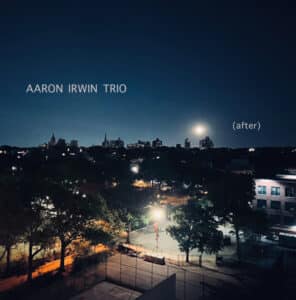Aaron Irwin and his musicians are almost creating a new art form
I’m not a music critic. I read and review a lot of poetry, but most days I don’t consider myself a poetry critic, either. But I love listening to music. Lately, when I go on long walks three to four times a week, I’m listening to Eremo by Jeff Johnson and John Van Deusen.
In their new album (After), the Aaron Irwin Trio has combined music and poetry to create something decidedly different. Each of the nine compositions orchestrates a poem; three include a recitation of the poem. “Orchestrate” may be the wrong word here; the musicians describe each selection as an interaction “between sound and verse.”
What the listener experiences is a wide array of emotions and responses — joy, chaos, beauty, anxiety, and more.
The music has strong elements of contemporary jazz (what the promotional materials call “avant-folk jazz”), but it extends beyond that. Composer Aaron Irwin plays the saxophone and clarinet, Mike Bagetta plays guitar, and Jeff Hirshfield is on drums. What I found helpful was to listen to each selection while reading the words of the poem in front of me (and all the poems can be found online), including the three that are recited. Some of the poems are better known than others, but they’re all intriguing selections.
One I particularly liked was “Frederick Douglas” by Robert Hayden, read by Bonita Oliver — one of the three compositions that include a recitation of the poem. Published in 1966, the poem celebrates the great champion of Black freedom. You can hear the poet read his poem here. The poem is below, and here is how the Aaron Irwin Trio weaves the music and the words together.
Frederick Douglass

and terrible thing, needful to man as air,
usable as earth; when it belongs at last to all,
when it is truly instinct, brain matter, diastole, systole,
reflex action; when it is finally won; when it is more
than the gaudy mumbo jumbo of politicians:
this man, this Douglass, this former slave, this Negro
beaten to his knees, exiled, visioning a world
where none is lonely, none hunted, alien,
this man, superb in love and logic, this man
shall be remembered. Oh, not with statues’ rhetoric,
not with legends and poems and wreaths of bronze alone,
but with the lives grown out of his life, the lives
fleshing his dream of the beautiful, needful thing.
In addition to the poem by Hayden, the other poems featured on the album are “Recuerdo” by Edna St. Vincent Millay; “Five Bells” by Kenneth Slessor; “The Hill” by Joshua Mehegan; “Pikes Peak” by Sarah Holland Batt; “When I Heard the Close of Day” by Walt Whitman; “The Cemetery” by Steve Scafidi (you’ll need to scroll down to the poem); “Daniel Boone” by Stephen Vincent Benet; and “The President Visits the Storm” by Shane McCrae (partly visible here).

Aaron Irwin
Irwin works as a freelance musician and has performed in clubs, concert halls, and Broadway theaters. He has his own group and has also performed with other jazz groups and individuals in New York, including Darcy James Argue’s Secret Society, Bob Sabin’s Tentet, Kristen Chenoweth, Rufus Wainwright, Josh Groban, and many others. He received a bachelor’s degree in music from DePaul University in Chicago and a master’s degree in music from the University of Miami. He serves on the faculty of the Packer Collegiate Institute in Brooklyn and has been an adjunct saxophone professor at Towson University in Baltimore He lives in New York City.
(After) blends and weaves poetry and music. At times moving and at times jarring (yes, I felt the anxiety of “Five Bells”), it demonstrates how music can be utilized to interpret and expand poetry, and how poetry can be utilized to illustrate music. Weaving the two together is something of an art form in itself.
Photo by p.a. hudson, Creative Commons, via Flickr. Post by Glynn Young.
How to Read a Poem uses images like the mouse, the hive, the switch (from the Billy Collins poem)—to guide readers into new ways of understanding poems. Anthology included.
“I require all our incoming poetry students—in the MFA I direct—to buy and read this book.”
—Jeanetta Calhoun Mish
- Longfellow’s “Paul Revere’s Ride”: Creating a National Legend - April 17, 2025
- Poets and Poems: Katie Kalisz and “Flu Season” - April 15, 2025
- Poets and Poems: Michelle Ortega and “When You Ask Me, Why Paris?” - April 10, 2025


Leave a Reply